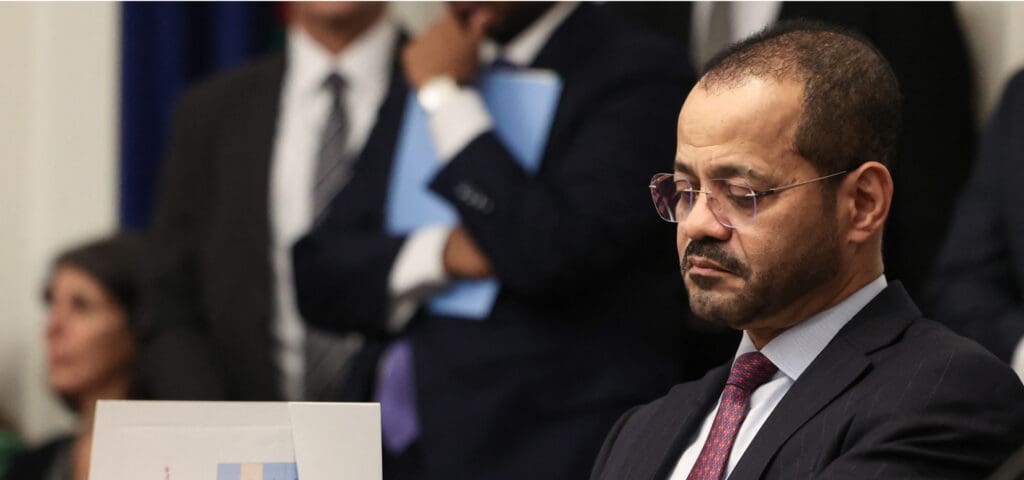The Saudi-Iranian renormalization agreement of March 2023 was a watershed in modern Middle Eastern diplomacy. Yet while China received much of the credit for the reconciliation, which cooled the flames of one of the region’s most tense rivalries, the previous two years of heavy lifting had largely been the work of Iraq and the Sultanate of Oman. It was only after Omani and Iraqi interlocutors realized that the deal would be more durable if backed by a major global power that they requested that the parties sign it in Beijing, under Chinese auspices.
Nineteen months later, Omani elites remain optimistic about the détente between the sultanate’s two neighbors. That the conflicts in Gaza and Lebanon have not derailed the progress made in lowering Riyadh-Tehran tensions contributes to this optimism. Most recently, Saudi Foreign Minister Prince Faisal bin Farhan Al Saud spoke about the kingdom’s relationship with Tehran when meeting Iranian President Masoud Pezeshkian in Doha at the start of this month. Stressing Saudi Arabia’s desire to further develop bilateral ties with the Islamic Republic, he said “we seek to close the page of differences between the two countries forever and work towards the resolution of our issues and expansion of our relations like two friendly and brotherly states.” One week later, Iran’s Foreign Minister Abbas Araghchi came to Riyadh and met with Saudi Crown Prince and Prime Minister Mohammed bin Salman for a discussion about bilateral and regional affairs.
These recent talks between high-ranking Saudi and Iranian officials have been critical to the kingdom’s efforts to avoid being dragged into the hostilities between Iran, on one side, and Israel and the United States, on the other. Such dialogue has also been important to Tehran’s quest to prevent its “Neighbors First” agenda from collapsing amid a time of intensifying conflict dynamics in the Middle East.
Along with easing Saudi-Iranian tensions, Muscat has been making efforts to help Bahrain and Egypt restore their own diplomatic ties with Iran, which Manama formally severed in 2016 and Cairo ended in 1980 in the wake of the Iranian revolution. This reflects Oman’s belief that Gulf security requires Arab-Iranian dialogue and cooperation, and that Arab alliances and sub-regional institutions should not be, by design, hostile to Tehran. Such thinking explains why Oman did not support the Gulf Cooperation Council’s (GCC) pro-Baghdad tilt in the Iran-Iraq war (1980-88), and why in 1991 Muscat facilitated the restoration of Saudi-Iranian relations, which Riyadh had severed following deadly clashes between Iranian Hajj pilgrims and Saudi riot police in 1987.
Oman as a Go-Between
Around the time of the Saudi-Iranian diplomatic breakthrough last year, Omani ruler Sultan Haitham bin Tariq traveled to Bahrain and held discussions with leaders in Manama about their relations with Iran. Since then, Bahraini and Iranian diplomats have held subsequent talks about renormalization at Iran’s embassy in Muscat.
Oman’s efforts build on its decades-long track record as Bahrain’s diplomatic bridge not only to Iran but also to Qatar. Longstanding territorial disputes between Manama and Doha reached a point in 1986 whereby they almost went to war over an artificial island off Qatar’s coast. Saudi mediation helped resolve that dispute, but Omani initiatives were key to launching the talks between Manama and Doha. A generation later, in early 2021, Oman and Kuwait played a critical diplomatic role that paved the way for Bahrain, Egypt, Saudi Arabia and the United Arab Emirates to lift their blockade of Qatar, resolving the unprecedented GCC crisis of 2017-21.
Since Saudi Arabia and Iran renormalized diplomatic relations last year, Sultan Haitham has been relaying messages between Egypt and Iran. On May 21, 2023, the Omani ruler visited Egypt and met with President Abdel Fatah el-Sisi in Cairo, where the two leaders discussed regional crises and the state of Egyptian-Iranian relations. One week later, Sultan Haitham was in Tehran meeting then-President Ebrahim Raisi and Supreme Leader Ayatollah Ali Khamenei, who said: “We welcome the Omani Sultan’s statement about Egypt’s willingness to resume relations with the Islamic Republic of Iran and we have no problem in this regard.”
Muscat has a history of trying to ease pressure on Egypt and improve Cairo’s relationships with other regional states. Oman was one of only three Arab League members that did not severe diplomatic relations with Cairo in response to the 1978 Camp David Accords with Israel. A visit by Haitham’s predecessor Sultan Qaboos to Alexandria in 1982 reflected Oman’s belief that Egypt had a sovereign right to break with pan-Arab norms and make its own decisions about normalization with Israel. According to some sources, Muscat served as an intermediary when Cairo-Tehran tensions peaked in 2009, and officials of both countries visited Oman.
Regional Calm as Oman’s National Interest
Such Omani initiatives aimed at easing friction between nearby Arab and Islamic countries are consistent with Muscat’s longstanding tradition of using diplomacy to promote “consensus-oriented solutions.” Such a diplomatic approach to foreign policy has been evident in Muscat’s dealings with Syria’s government and Yemen’s Houthi movement, which in the recent past have placed Oman at odds with most of its fellow GCC members.
The Omani leadership has long seen turmoil and conflict in the Gulf and the greater Middle East as a serious threat to the sultanate’s security, believing that it is vulnerable to the spillover of chaos plaguing nearby countries such as Iraq, Syria and Yemen. At the same time, the leadership in Muscat has long recognized how greater peace in the neighborhood serves Oman and its neighbors’ commercial interests. In this sense, Muscat’s efforts to facilitate diplomacy and dialogue between regional adversaries can be seen as fundamentally pragmatic.
Rather than functioning as mediator, as such, Oman has mostly been a facilitator of talks aimed at reducing tension between states in the region and beyond. Oman remains the GCC’s most Iran-friendly member. It hosted secret ceasefire talks between Tehran and Baghdad during the Iran-Iraq War in the 1980s, before investing in closer relations with the Islamic Republic after that conflict ended. This earned the Muscat government much good will with Tehran, making it stand out as an Arab monarchy with deep ties to the West—yet one very much trusted by the Islamic Republic.
Quiet but Effective Diplomacy
Building on its GCC membership and special relationship with Tehran, Oman has been able to provide diplomatic spaces for fellow Arab states to engage the Iranians at sensitive times, when direct engagement could have been far more politically challenging. The preparatory talks for the Saudi-Iranian détente began in Baghdad in April 2021, as rocket attacks by Yemen’s Houthis sent tensions soaring between Riyadh and Tehran, followed by subsequent rounds in As an intermediary keen to mitigate the risks of conflicts between regional states, Oman’s facilitation of dialogue does not always make headlines. The country tends to be discreet and keep a low profile when engaging in such diplomacy. But as history demonstrates, this strategy has repeatedly proven effective.
Throughout his 50-year rule, from 1970-2020, Sultan Qaboos made diplomacy, peacemaking and geopolitical neutrality pillars of Omani identity. Since he took the helm nearly five years ago, Sultan Haitham has continued with his predecessor’s efforts to keep the sultanate positioned as a credible facilitator of dialogue and a trusted diplomatic bridge between adversaries in the Middle East.
The opinions expressed in this article are those of the author and do not necessarily reflect the views of the Middle East Council on Global Affairs.


